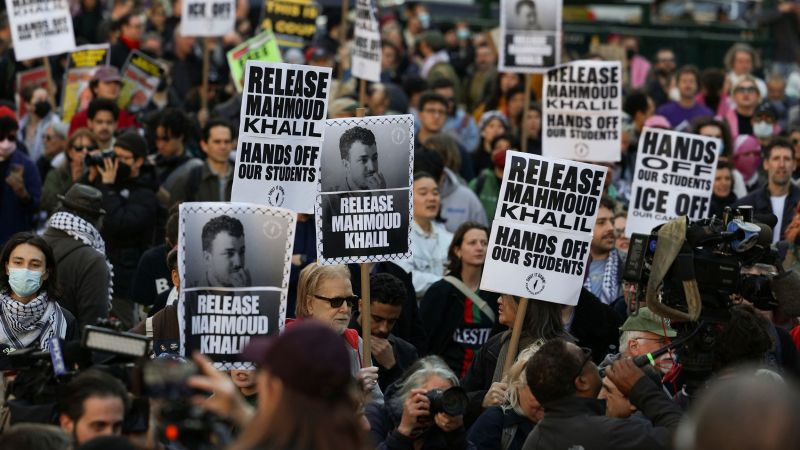
Not long after the October 2023 Hamas attacks in Israel and subsequent war in Gaza, Ross Glick’s inbox flooded with tips, photos, video and information about students and faculty members participating in pro-Palestinian protests on US college campuses. As many protesters rallied against Israel’s military response and demanded a ceasefire, Glick – a pro-Israel activist – focused on the emails and would temporarily join New York-based Betar USA, a self-described Zionist advocacy group with a motto of “Jews fight back.” The tips would become part of Betar’s effort to compile information and expose certain protesters that Glick claims wanted not just to support Palestinians but also to incite violence and hatred toward Jews.
Now, as the Trump administration has begun arresting and trying to deport several noncitizen students and academics – some of whom were pro-Palestinian protesters – Betar says it’s been telling the administration whom to look for. Betar says it shared with the government a list of noncitizen protesters and activists it believes should be deported. It says the effort is in response to President Donald Trump’s January executive order, which promised to “combat antisemitism” on college campuses.

An accompanying administration fact sheet said the government could seek to deport noncitizen “Hamas sympathizers,” participants of “pro-jihadist protests” and people accused of antisemitic acts. “Our research, our information, the massive amount of video and photos that we have gathered – we create our dossiers and our reports. We hand them over, we make recommendations,” Glick, who left his executive director post at Betar about a month ago after helping establish its research operation, told CNN in a recent interview.
Betar – which the Jewish civil rights group Anti-Defamation League put on a list of groups that it says promote extremist or hateful ideologies, an action Betar calls a baseless smear campaign – has been open about flagging noncitizen protesters for possible deportation. “We submitted the names of hundreds of protesters and activists to the Trump administration/DHS urging ICE to deport them under the executive orders,” Daniel Levy, a spokesperson for Betar, told CNN in March. Besides claiming to give this information to the government, Betar – and other pro-Jewish groups – have posted online the names, pictures and other information of noncitizen pro-Palestinian protesters who they allege expressed Hamas support or Jewish hate.
Whether the government is using that information is unclear. Meanwhile, the tactics of Betar and other groups, including Canary Mission, have drawn various concerns. Supporters of recently detained academics decry the groups’ efforts as inappropriate harassment and a disinformation campaign.
Privacy experts with whom CNN spoke say the documentation exposes tensions between the chilling of free speech and minimal expectations of privacy in public places, and it raises concerns about the extent to which a government should use information distributed by outside groups. And a student profiled by one of the groups – while not among the detained – says the profile inaccurately describes her and caused her to endure death threats, anxiety and depression. A number of academics detained this year to await deportation proceedings were profiled online by at least one of these groups, including Mahmoud Khalil , a prominent figure in last year’s protests at Columbia University, and Rumeysa Ozturk , a Tufts University doctoral student taken away by immigration officers outside her Massachusetts apartment last week.
Neither has been criminally charged, and their supporters have argued they’ve been falsely portrayed and that the administration has no basis for deporting them. The State Department declined to answer CNN’s question about whether it has used information from Betar or any similar group. Secretary of State Marco Rubio last week said: “We’re not going to talk about the process by which we’re identifying” deportation targets “because obviously we’re looking for more people.
” A State Department spokesperson told CNN the agency uses “all available technology” in visa screenings and vetting. “No matter how information comes to our attention, every visa decision is made by trained consular staff who review the information to ascertain whether a visa revocation is supported by the facts and law,” the spokesperson said. The White House press secretary has said the Department of Homeland Security used “ intelligence ” to identify international student protesters who it thinks might have engaged in deportable offenses, but did not offer details.
“US Immigration and Customs Enforcement is not working with or received any tips through the ICE Tip Line from the groups identified as Betar and Canary Mission,” a DHS spokesperson told CNN. What the groups say they do According to Glick, when tipsters have flagged unidentified students and faculty, Betar has used facial recognition technology, artificial intelligence and open-source information such as social media postings and media appearances to help put names to the subjects. “Once it became known through our circles that we were undertaking this process, and before I even got involved with Betar, I had people contacting me from all over the country,” said Glick, who said he left his Betar role to pursue other projects.
Glick’s X profile boasts photos and videos of a recent visit to Capitol Hill, and videos in which he appears to confront people at pro-Palestinian rallies. Even after leaving Betar, he wants to expose what he describes as an “organized effort” against the Jewish community, he says. Betar also recently took credit for a pair of incendiary stickers that appeared on a pole on Harvard Law School’s campus last week.
The school sent a letter to students condemning the stickers, saying they were “posted in violation of campus policies.” One of the stickers read, “Don’t be Mahmood Khalil. Be a racist if you want, just keep it to yourself #JFB (Jews fight back),” according to a Harvard University employee familiar with the incident.
A different sticker read, “I am a green card holder who loves America. I will never be deported. Are You?” the Harvard Crimson reported .
Glick and Betar are not alone. The anonymously run Canary Mission website says it “documents individuals and organizations that promote hatred of the USA, Israel and Jews on North American campuses and beyond.” It also says it will profile people who support efforts to boycott, divest from or sanction Israel or companies associating with Israel – which were among the demands of some campus pro-Palestinian protests last school year.
The site, which says it gathers content from publicly available sources and invites tips, contains purported bios of students and others. Bio pages have subjects’ photos, social media posts, media appearances and writings. A Canary Mission spokesperson told CNN by email the group is apolitical and does not have any contact with the Trump administration.
The group said its research is posted publicly for anyone to see following what it describes as careful vetting and fact checking, and did not respond to a question about who operates Canary Mission. “When people view the profiles on our site, we hope they understand that hateful actions and words do carry consequences,” the Canary Mission spokesperson told CNN. “We believe sunlight is the best disinfectant, and by highlighting these behaviors, we encourage accountability and raise awareness of the widespread impact that antisemitic and hateful speech can have — both within and beyond campus communities.
” ‘Dehumanizing doxing campaign,’ lawyers say Khalil, a legal permanent US resident, participated in pro-Palestinian protests at Columbia last year before finishing his work on a master’s degree there in December. Khalil was arrested outside his New York apartment March 8 after the Trump administration alleged, without providing evidence, that Khalil “led activities aligned to Hamas.” His attorneys have denied he has any ties to Hamas.
The Trump administration has argued , in part , Khalil is a threat to US security, citing a law that allows noncitizens to be deported if their presence has “potentially serious adverse foreign policy consequences for the United States.” In a filing against this detention, Khalil’s lawyers noted Betar’s claim it had submitted to the government the names of hundreds of activists it wanted deported. His lawyers also highlighted a January 29 X post from Betar that said Khalil was “on our deport list.
” His lawyers also asserted the post falsely accused him of making inflammatory statements against Zionists. A day before he was arrested, Khalil emailed the university’s interim president to ask for legal support and other protections , his lawyers said in a court document. In the email, Khalil cited what his lawyers called a “ dehumanizing doxing campaign against him,” according to the document.
“I haven’t been able to sleep, fearing that ICE or a dangerous individual might come to my home,” Khalil wrote, according to a court document. After Khalil’s detention, more arrests came. Ozturk, the Tufts doctoral student, was arrested March 24 near the Massachusetts school’s Somerville campus.
A Turkish national on a student visa, she is accused of having “engaged in activities in support of Hamas,” a DHS spokesperson said , without specifying those activities. Her lawyers say she is unfairly being punished for speaking out for Palestinian rights. Canary Mission had profiled her, calling her a supporter of the movement to boycott, divest from and sanction Israel.
It links out to a March 2024 opinion piece that Ozturk co-wrote in the school’s newspaper in which she criticized Tufts’ response to a student government group’s call for the university to divest. Ozturk’s brother issued a statement accusing Canary Mission of targeting Ozturk strictly for her political views. “Canary Mission terrorizes supporters of Palestine by equating the Palestinian issue with terrorism and encourages the restriction of basic rights and freedoms,” Asim Ozturk wrote.
Lawyers for other students detained or sought for deportation proceedings, including Momodou Taal and Yunseo Chung , also noted groups’ efforts to identify the students, court documents show. Exposed and in fear Sara Rasikh, a University of Toronto graduate student who was born and raised in Pakistan and moved to Canada in 2013, learned Canary Mission had published information about her. Then she began receiving harassing messages and death threats on social media.
The Canary Mission profile was created after she took a forward-facing role in pro-Palestinian protests on her college campus last year, acting as a spokesperson for an encampment on school grounds, Rasikh said. “Many students avoid engaging in Palestine solidarity organizing out of fear for their future career, their immigration status, and that is no way for a society to be functioning,” Rasikh said. “Doxing is not new – racialized movements have long faced surveillance, harassment, repression, all the different tactics, and Canary Mission is part of this legacy,” she said.
Rasikh’s Canary Mission profile shows screenshots of her social media activity, photos and video of her at protests, along with a biography describing her as a supporter of Hamas. “I’ve never spoken to or about Hamas, but my headline says that I support Hamas, which isn’t true,” she said. Rasikh said the online profile has resulted in harassment, impacted her mental health and professional prospects, and caused her to fear for her safety and suffer from anxiety and depression.
“They are creating these profiles and these personalities for us that are so distant from reality, taking what we’re saying and twisting it to serve their narrative to incite fear and harm and violence,” Rasikh said. Privacy in the public square Privacy experts say while the groups’ activities raise serious concerns that exposure could prevent people from demonstrating, their actions may be within legal limits because they rely on publicly available information. Groups like Betar and Canary Mission take information that is available across a range of disparate sources –- including social media feeds, pictures, school affiliations, LinkedIn profiles and even home addresses.
But using publicly available information to compile a list of deportation targets – and sharing with government officials who may use it to direct law enforcement action solely on the basis of their political opinions – raises concerns that people’s right to free speech and privacy is being infringed upon, said Megan Iorio, senior counsel and amicus director at the Electronic Privacy Information Center, a nonprofit research and advocacy group in Washington, DC. “Even if people don’t like what they’re saying, they have the right to say it,” Iorio said. “On top of that, what they’re doing is then labeling these people as antisemites,” Iorio said.
“So, this label that carries with it a lot of weight that can have implications for their reputation, and now also their ability to either stay in the country or to avoid criminal penalties for just speaking is enormous.” Defamation, if something incorrect is published, could be the clearest available cause of legal action because of the potential reputational harm caused to the person whose photo is published, Iorio said. Protesters also could pursue legal remedies if they can show they were harmed, such as through harassment or violence, Iorio said.
Sophia Cope, a senior staff attorney on the Electronic Frontier Foundation’s civil liberties team, says a main problem would be if the government is using the groups’ information to punish legally protected speech. “People who go to protest should understand that they are exposing themselves to other people’s cell phone videos, to media that’s there,” Cope said. But “if the government acts on information to punish the targets for what appears to be legal activity, that’s the real problem,” she said.
CNN’s Jennifer Hansler and Sarah Boxer contributed to this report..















